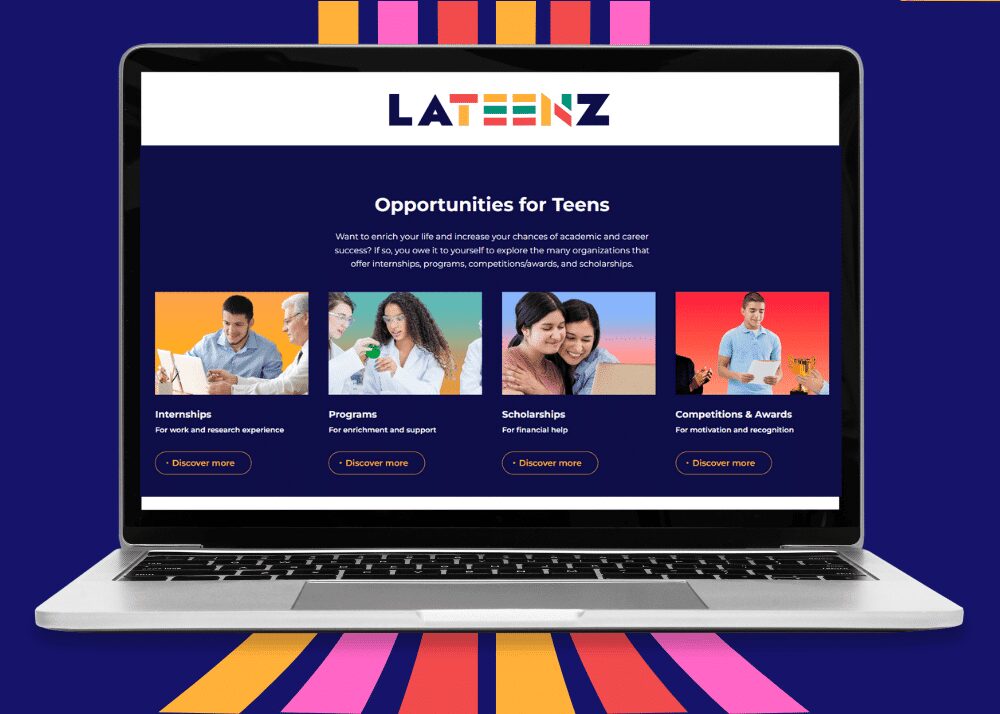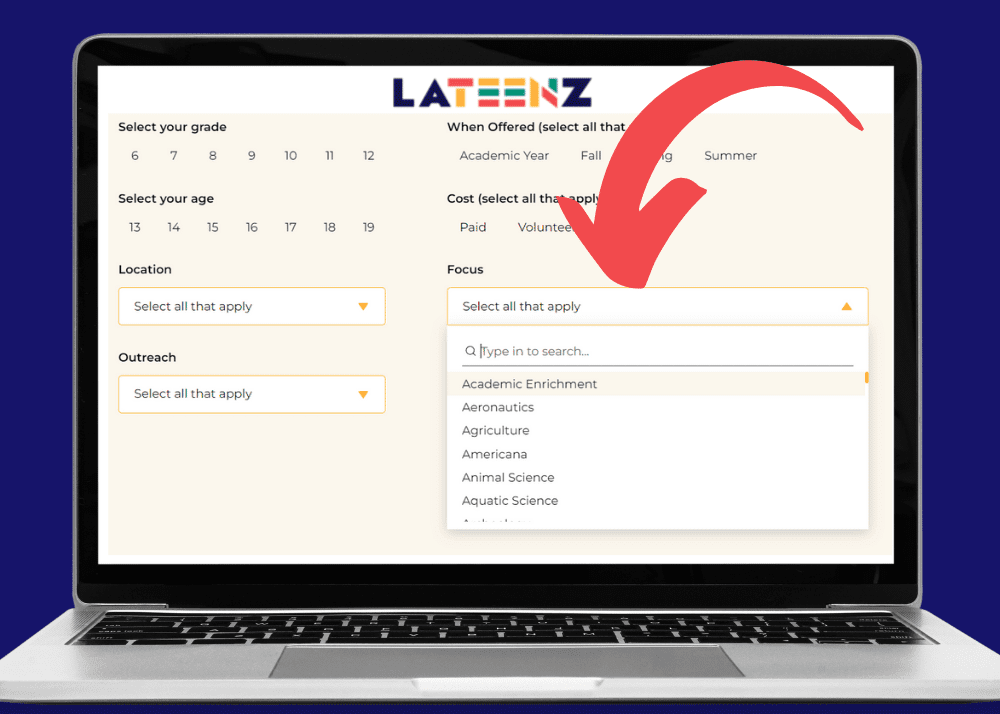Ultimate Guide to High School Internships
How to find the right high school internship for you! Here’s everything you need to know.
Why Are High School Internships Important?
High school internships are a great opportunity to develop valuable skills, learn about a career, make connections, and help build a resume for your next step in life. If you’re a high school student, we highly recommend that you try to get an internship, whether you plan to attend college, get vocational training, or move straight to full-time work after graduation.

How Can Lateenz Help You Find a High School Internship?
Students at the top high schools in the U.S. typically have access to experienced counselors and family/friend networks that can help them find and get hired for the best internships. Unfortunately, if you don’t attend one of these schools, you may not fully understand what internships are, why they are important, or how to find them. And even if you do know, it can take a lot of research (think hours of internet searches, emails, and/or phone calls!) to find an internship completely on your own.
Here at Lateenz, we’ve put together one of the best databases of internships for high school students on the internet. We’ve also made it easy and free for everyone to use — regardless of race, ethnicity, gender, where you go to school, or how much money your family has. What’s more, we make an effort to find and highlight internships that offer outreach to (make a special effort to include) Hispanic or Latino/x high school students who, as a group, traditionally have been underrepresented in certain fields and industries. This outreach also often includes students who identify as Black, female, economically disadvantaged/lower income, or first-generation Americans, or who will be the first in their families to go to college.
We encourage you to check out our extensive database of high school internships and use our search engine to help you explore. To make the most of our database, however, it helps if you are familiar with all the ins and outs of internships before you start searching. So, keep reading to find out everything you ever wanted to know about high school internships — and maybe some things you didn’t even know to ask!

What is a High School Internship?
A high school internship is a job that includes valuable educational experiences. While it’s true that you can learn something from any job (especially if you have the right attitude!), a good internship is one in which the employer or sponsor purposefully adds a meaningful educational component into your overall work experience. This doesn’t mean that your employer will be sending you to school while you are working; it means that the employer is making a special effort to make sure you learn something important to the employer’s industry or career path while you are doing your job. There are different ways that an employer could do this, but the most common ones include providing you the opportunity to:
- develop foundational (beginner-level) skills that are necessary to the career or a permanent job in the industry;
- participate in a representative project that gives you a taste of what the career or industry is like; and/or
- interact with experienced professionals/employees for networking and mentoring purposes.
Here’s an example:
A group of scientists work in a laboratory doing research to try to cure a particular disease. In the course of their work, they use a lot of test tubes and other equipment that needs to be cleaned and organized on a daily basis. To get help with this, the scientists might decide to offer you a job where you wash and organize the equipment in exchange for an hourly wage. Or, they might decide to offer you an internship where, in addition to doing some work washing and organizing the equipment, the scientists teach you about their project and either let you help on some of the easier parts of their research, or help you work on a small project of your own.
Internship vs. Programs: What’s the Difference Between an Internship and a Program?
It’s important to understand that just because something is called an internship, doesn’t mean that it meets our definition of one. For example, some organizations offer opportunities that they call “internships” but that are primarily educational in nature and have either no work component or a very small one.
Out-of-school (extracurricular) opportunities for high school students that are mainly educational are usually referred to as “programs,” and we prefer to call them that as well. If an opportunity involves time in a classroom, it’s probably a program (even if it’s called an internship). Also, if an opportunity lasts less than a month, it’s also likely a program. Many programs are excellent and valuable opportunities, and Lateenz also has a whole other database dedicated to summer and academic year programs for high school students!
But, if you’re looking for work experience, a program may not fit the bill. To be clear: it’s not necessarily that anyone is trying to be misleading, but there are just no set rules about what the different terms mean. And sometimes, the line between an internship and a program isn’t always obvious, depending on the work-to-education ratio/mix of the opportunity. (In fact, sometimes it’s even hard for us to tell! When that happens, we list the opportunity under both the Internship and Program categories in the Lateenz database.)
Types of Internships
Employers offer internships for high school students in different areas such as the arts, business, engineering, information technology, journalism, politics, science, technology, and more! You can get a sense of all the different types that companies and organizations offer by using the Lateenz high school internship database. In the search engine for the internships database, just click on the “Focus” drop-down menu to see the available options.

If you’re new to Lateenz, however, we recommend that you first scroll through all the internships briefly without using the search engine. Then, once you get a sense of what’s out there, you can use the search engine to narrow your research.
Keep in mind that the more filters you apply with the search engine, the fewer results you’re going to get. If you can be open to ideas and flexible, you’ll have a better chance of finding something that could work for you.
Are Internships Paid?
Many internships for high school students are paid, but there are also internships where you will be asked to volunteer. Internships that offer payment usually will give you either a salary based on the number of hours you work (for example, $12 per hour) or a stipend (a one-time payment for the entire time you are scheduled to participate in the internship, for example, $2,000 over 8 weeks). Heads up: if you are asked to pay to participate in an internship, you should ask more questions. It may be that the opportunity you are being offered is really a program (which can also be valuable), but it’s likely not an “internship” by our definition.
Whether or not a high school internship is paid usually depends on a few different things:
- Your age – In most states, you must be at least 15 or 16 years old for an employer/organization to formally hire you for a paid job. Also, the older you are, the more likely you will be able to do something valuable to the employer.
- The type of employer/organization providing the internship – In our experience, larger, more profitable businesses and organizations are more likely to pay high school interns. In addition, non-profits that want to increase participation by traditionally underrepresented high school students are more likely to offer payment, because they recognize that those students may need to earn money during the summer to help their families or save for college.
- The work-to-education ratio of the internship – While this isn’t always the case, opportunities with a greater work component may be more likely to pay interns.
When Do Internships Take Place?
Most take place during the summer months, simply because that’s when high school students have the most free time! However, some take place during the school year (usually on weekends) or start by giving you training on the weekends during the school year and then move you to full-time during the summer.
There is also a special type of internship for high school students called a “work-study program” (again, you can’t always rely on the name of an opportunity to figure out what it is!). In a work-study program, your school and an employer work together to combine working and studying. You still go to school during the academic year, but you focus on core subjects and have a shorter school day. Then, in the afternoon, you go to work for an employer that makes a commitment to train you on the basic skills you need to start working full time after you graduate. An example of this is the High School Work Study Program sponsored by the U.S. National Security Agency.
Where Do High School Internships Take Place? Commuter vs. Residential vs. Online Internships

Commuter Internships
The majority of high school internships take place in the facilities (workspaces like offices, labs, etc.) of the organization offering the internship, and most internships require that high school students live in the area nearby. In the Lateenz database, we call these “commuter” internships because the employer wants you to live at home (or find your own housing) and commute to work every day.
Residential Internships
There are some internships, however, where the employer will provide housing and, in some cases, even meals and transportation to the location of the internship. These internships tend to be sponsored by a college or university that has unused dormitory space during the summer. Also, some outdoor-focused internships (such as environmental, habitat or forestry internships) may offer housing if their outdoor work locations are remote or less accessible. A residential internship offers the possibility of working for a company or organization that may not be close to where you live.
Online Internships
Finally, some internships are held online. This means that you will work from home and interact with your coworkers via an internet platform. Online internships have upsides and downsides. The downsides first: you need a computer and good internet access, and you won’t have in-person interaction with your coworkers either on the job or outside of work. The upsides: you aren’t limited by where you live in terms of the opportunity to participate, and you save time and money by not commuting.
Is It Hard to Get an Internship as a High School Student?
Because internships have a work component (the job part), they are almost always selective (which means not everyone who applies is hired. However, some internships are much harder to get than others. Internships that require specific skills or knowledge (such as advanced science or math education or excellent writing skills) will be more competitive. But please don’t let that discourage you from trying to get an internship; there are internships for motivated high school students, regardless of skill level.
Do Internships Help With College Applications?
Colleges look at high school internships as part of a student’s “extracurricular activities” (a big name for all the things you do outside of the classroom). It will never hurt you to have an internship on your college application. How much it helps will depend on which college(s) or vocational training program(s) you are trying to get into.
If you are applying to a super-competitive college, the admissions committee will give more weight to an internship that is also super competitive (meaning, really hard to get), because being selected for one of those internships usually means you are ready to do advanced college-level work. If you are applying to a specific program within a college (such as journalism, engineering pre-med, etc.) or a specific vocational training program (such as medical assistant, automotive, electrical, etc.) then having done an internship in the same field will be more helpful that an internship in an unrelated field.
But this is important: although it’s good to understand how colleges view internships, it’s even more important to keep in mind that the real reason to participate in an internship is because you get the chance to learn something that hopefully interests you while exploring what to do with your life. If you take an internship just because it seems prestigious and helps you climb another rung on the college application process, you may eventually find that you’re on the wrong ladder or missed another opportunity that would have been better for you.
What If I Don’t Find an Internship in the Lateenz Database That Works for Me?
Although we have many internships for high school students listed in the Lateenz database, finding one that works for you ultimately depends on a combination of where you live, how much time you have, how old you are, what you’re interested in, and how selective the internship is. Because all these factors have to come together, it’s possible that you may not find a good fit in our database. What should you do if this happens? We have three suggestions:
- Check out local government agency resources – Some states, as well as larger cities and counties, have government agencies that help connect high school students with local employers. Here’s an example for Arlington County in Virginia. (We don’t include these resources/internships in our database because they tend to be hyper-local and change a lot from year to year.) To see if something similar exists where you live, just “Google” the name of your state, county, or city, plus the term “high school internship,” and see what comes up. Be aware that, in some cases, the “internships” you find through these sites may be more like regular “jobs,” but – even if that’s the case, you could try our next suggestion.
- “Create” your own internship – If there aren’t any real “internships” being offered in your area, it’s worth trying to see if you can get a regular job and make it into more of a learning experience! For example, if you can get a job as a camp counselor, ask if you can rotate through different responsibilities, or work all or part of the time on the “business end” of the camp. Maybe you can offer to help with the camp’s social media accounts, get involved in the higher-level planning and coordinating of camper activities (instead of just chaperoning), or learn how they order supplies for the camp! You may get rejected, but you may also be surprised by the number of employers that want to help young people and are impressed when they show initiative.
- Talk to your high school counselors – they may not have the time to help you find an internship, but high school counselors sometimes get employer leads that they can pass along to students.
- Consider attending a “program” instead – Even though programs (at least as we define them) don’t have a significant work component, there are many high-quality programs that also can help you develop valuable skills and move your education and career forward. In addition to our internship database, Lateenz offers a database of summer and academic year programs for middle and high school students – and many of the programs we list are free or will pay you to attend!
Additional Resources
To learn more about specific types of internships for high school students, check out these resources:

Happy hunting! And to keep on top of the latest internships, programs, competitions and scholarships for middle and high school students (many of which do outreach to Hispanic and Latino/x teens), be sure to follow us on Instagram and Twitter.
Related articles
-
 Student Life45+ Exciting Environmental Science Internships for High School StudentsOctober 18
Student Life45+ Exciting Environmental Science Internships for High School StudentsOctober 18 -
 Student Life7 Great High School Internships in the Visual ArtsOctober 18
Student Life7 Great High School Internships in the Visual ArtsOctober 18 -
 Info / InspirationHigh School Internship Spotlight: ArtWorks CincinnatiAugust 26
Info / InspirationHigh School Internship Spotlight: ArtWorks CincinnatiAugust 26 -
 Student LifeUltimate Guide to Middle and High School CompetitionsOctober 26
Student LifeUltimate Guide to Middle and High School CompetitionsOctober 26
Most popular
-
 Student Life35 Top Science Competitions for High School StudentsJanuary 31
Student Life35 Top Science Competitions for High School StudentsJanuary 31 -
 Info / InspirationVoto Para La Mujer Quarter is a Major “Change”!July 29
Info / InspirationVoto Para La Mujer Quarter is a Major “Change”!July 29 -
 Student Life35+ High School Internships in the Bay AreaJanuary 22
Student Life35+ High School Internships in the Bay AreaJanuary 22 -
 Student Life90+ Best Writing Competitions for High School StudentsApril 13
Student Life90+ Best Writing Competitions for High School StudentsApril 13 -
 CultureA Smashing Success: The Surprising History of the Piñata in Latino/x CultureSeptember 27
CultureA Smashing Success: The Surprising History of the Piñata in Latino/x CultureSeptember 27

